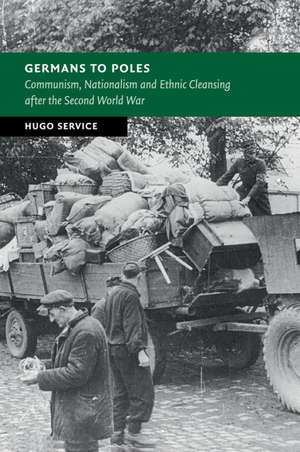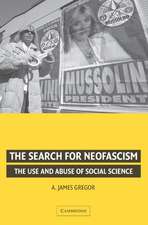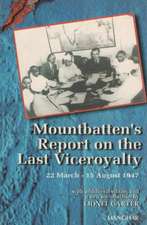Germans to Poles: Communism, Nationalism and Ethnic Cleansing after the Second World War: New Studies in European History
Autor Hugo Serviceen Limba Engleză Paperback – 25 noi 2015
| Toate formatele și edițiile | Preț | Express |
|---|---|---|
| Paperback (1) | 322.12 lei 6-8 săpt. | |
| Cambridge University Press – 25 noi 2015 | 322.12 lei 6-8 săpt. | |
| Hardback (1) | 758.35 lei 6-8 săpt. | |
| Cambridge University Press – 10 iul 2013 | 758.35 lei 6-8 săpt. |
Din seria New Studies in European History
-
 Preț: 177.91 lei
Preț: 177.91 lei -
 Preț: 238.02 lei
Preț: 238.02 lei -
 Preț: 208.50 lei
Preț: 208.50 lei -
 Preț: 398.42 lei
Preț: 398.42 lei -
 Preț: 237.92 lei
Preț: 237.92 lei - 9%
 Preț: 593.91 lei
Preț: 593.91 lei -
 Preț: 180.06 lei
Preț: 180.06 lei - 9%
 Preț: 592.61 lei
Preț: 592.61 lei -
 Preț: 169.70 lei
Preț: 169.70 lei -
 Preț: 211.13 lei
Preț: 211.13 lei -
 Preț: 166.99 lei
Preț: 166.99 lei -
 Preț: 266.53 lei
Preț: 266.53 lei -
 Preț: 241.90 lei
Preț: 241.90 lei -
 Preț: 429.99 lei
Preț: 429.99 lei -
 Preț: 400.05 lei
Preț: 400.05 lei - 11%
 Preț: 698.50 lei
Preț: 698.50 lei -
 Preț: 275.85 lei
Preț: 275.85 lei -
 Preț: 330.09 lei
Preț: 330.09 lei - 11%
 Preț: 695.93 lei
Preț: 695.93 lei -
 Preț: 423.10 lei
Preț: 423.10 lei -
 Preț: 340.13 lei
Preț: 340.13 lei - 11%
 Preț: 698.30 lei
Preț: 698.30 lei -
 Preț: 326.82 lei
Preț: 326.82 lei -
 Preț: 339.37 lei
Preț: 339.37 lei -
 Preț: 396.59 lei
Preț: 396.59 lei -
 Preț: 383.48 lei
Preț: 383.48 lei -
 Preț: 292.40 lei
Preț: 292.40 lei - 14%
 Preț: 682.94 lei
Preț: 682.94 lei -
 Preț: 282.75 lei
Preț: 282.75 lei -
 Preț: 417.07 lei
Preț: 417.07 lei -
 Preț: 437.18 lei
Preț: 437.18 lei - 14%
 Preț: 873.67 lei
Preț: 873.67 lei -
 Preț: 420.40 lei
Preț: 420.40 lei -
 Preț: 319.99 lei
Preț: 319.99 lei - 14%
 Preț: 687.39 lei
Preț: 687.39 lei -
 Preț: 397.01 lei
Preț: 397.01 lei - 11%
 Preț: 695.93 lei
Preț: 695.93 lei - 11%
 Preț: 543.84 lei
Preț: 543.84 lei
Preț: 322.12 lei
Nou
Puncte Express: 483
Preț estimativ în valută:
61.65€ • 64.12$ • 50.89£
61.65€ • 64.12$ • 50.89£
Carte tipărită la comandă
Livrare economică 14-28 aprilie
Preluare comenzi: 021 569.72.76
Specificații
ISBN-13: 9781107595484
ISBN-10: 1107595487
Pagini: 390
Ilustrații: 7 maps
Dimensiuni: 154 x 228 x 20 mm
Greutate: 0.52 kg
Editura: Cambridge University Press
Colecția Cambridge University Press
Seria New Studies in European History
Locul publicării:New York, United States
ISBN-10: 1107595487
Pagini: 390
Ilustrații: 7 maps
Dimensiuni: 154 x 228 x 20 mm
Greutate: 0.52 kg
Editura: Cambridge University Press
Colecția Cambridge University Press
Seria New Studies in European History
Locul publicării:New York, United States
Cuprins
Introduction; 1. Eastern Europe, 1939–44: occupation, expulsion, killing; 2. Poland, 1939–49: territory and Communism; 3. War and peace; 4. Expulsion; 5. Repopulation; 6. Verification; 7. Expellees, settlers, natives; 8. Holocaust survivors and foreigners; 9. Assimilation; 10. Culture, religion, society; Conclusion: Eastern Europe, 1944–9: Communism, nationalism, expulsion; Bibliography.
Recenzii
'A magisterial overview of forced population movements across all of Eastern Europe at the end of the Second World War and in its aftermath. Service's monograph thus serves as a highly useful introduction to the phenomenon for non-specialist historians and social scientists with limited familiarity with the phenomenon, even as the detailed case studies are essential reading for researchers in this burgeoning field of study.' James Bjork, Slavonic and East European Review
'In this admirable new book, 'Germans' did not become 'Poles' but were banished, silenced, or murdered by them … Germans to Poles deepens recent study of the long-neglected destruction of German life in eastern Europe … Service supplies valuable and student-friendly chapters.' William W. Hagen, Slavic Review
'… specialists in the field of postwar Eastern European history will value the richness of the book's narration of the disorder and disruption that defined everyday life in early postwar Poland …' Michael Meng, The American Historical Review
'Service offers an extensively researched synthesis which brings to light significant archival materials on the population movements that remade a broad swathe of Central Europe. From the vantage point of two small and contrasting centres, Service helps his scholarly readership understand mechanisms that made ethnic cleansing a part of everyday life.' Andrew Demshuk, European History Quarterly
'[Hugo Service] knowledgably places Poland's state-driven policy of resettlement and expulsion … within the long-term national conflicts between Germany and Poland from the time [of] the Kaiser's Empire though to the post-WWII years … With [his] important stud[y] … Service ha[s] rightly drawn attention to the fact that only by accepting this chronology is the contextualisation … and, ultimately, a pluralisation of memory possible.' Björn Hofmeister, translated from Zeitschrift für Geschichtswissenschaft
'Services's work excels at painting a vivid portrait of … communities in flux. … [He] provides excellent on-the-ground details of these myriad local tensions … Germans to Poles serves as a useful comparative study that relates the violent remaking of east central Europe along ethno-national lines to the diverse local-level consequences of this grand project.' Brendan Karch, German History
'Hugo Service's monograph is a significant step forward to a better understanding of the complicated migration and nationalization processes that were under way in Poland's northern and western territories between 1939 and 1949 … The book is clearly written and structured and will therefore reach out not only to academics from the field but also to a more general public … One of the most excellent features of the book is its rich archival base.' Jan Musekamp, Polish-Studies.Interdisciplinary (www.pol-int.org)
'This work is valuable as an overview and summary … and thanks to extensive use of documents from Polish archives this work throws extensive light on the process of 'verification' in Upper Silesia.' Matthias E. Cichon, translated from Zeitschrift für Ostmitteleuropa-Forschung
'Service's thoughtful tome builds upon prior works by Michael Fleming and Gregor Thum that addressed questions of defining and creating Polish identities … Recommended. Upper-division undergraduates and above.' R. K. Byczkiewicz, Choice
'Hugo Service's monograph is a significant step forward to a better understanding of the complicated migration and nationalization processes that were under way in Poland's northern and western territories between 1939 and 1949. … One of the most excellent features of the book is its rich archival base.' Jan Musekamp, Pol-Int
'With his study Germans to Poles, Hugo Service provides a deep insight into and understanding of these complex processes and offers a step toward studying this area of postwar European history … Based on a rich variety of sources, Service's study is clearly written and well structured.' Agnes Laba, H-Poland
'In this admirable new book, 'Germans' did not become 'Poles' but were banished, silenced, or murdered by them … Germans to Poles deepens recent study of the long-neglected destruction of German life in eastern Europe … Service supplies valuable and student-friendly chapters.' William W. Hagen, Slavic Review
'… specialists in the field of postwar Eastern European history will value the richness of the book's narration of the disorder and disruption that defined everyday life in early postwar Poland …' Michael Meng, The American Historical Review
'Service offers an extensively researched synthesis which brings to light significant archival materials on the population movements that remade a broad swathe of Central Europe. From the vantage point of two small and contrasting centres, Service helps his scholarly readership understand mechanisms that made ethnic cleansing a part of everyday life.' Andrew Demshuk, European History Quarterly
'[Hugo Service] knowledgably places Poland's state-driven policy of resettlement and expulsion … within the long-term national conflicts between Germany and Poland from the time [of] the Kaiser's Empire though to the post-WWII years … With [his] important stud[y] … Service ha[s] rightly drawn attention to the fact that only by accepting this chronology is the contextualisation … and, ultimately, a pluralisation of memory possible.' Björn Hofmeister, translated from Zeitschrift für Geschichtswissenschaft
'Services's work excels at painting a vivid portrait of … communities in flux. … [He] provides excellent on-the-ground details of these myriad local tensions … Germans to Poles serves as a useful comparative study that relates the violent remaking of east central Europe along ethno-national lines to the diverse local-level consequences of this grand project.' Brendan Karch, German History
'Hugo Service's monograph is a significant step forward to a better understanding of the complicated migration and nationalization processes that were under way in Poland's northern and western territories between 1939 and 1949 … The book is clearly written and structured and will therefore reach out not only to academics from the field but also to a more general public … One of the most excellent features of the book is its rich archival base.' Jan Musekamp, Polish-Studies.Interdisciplinary (www.pol-int.org)
'This work is valuable as an overview and summary … and thanks to extensive use of documents from Polish archives this work throws extensive light on the process of 'verification' in Upper Silesia.' Matthias E. Cichon, translated from Zeitschrift für Ostmitteleuropa-Forschung
'Service's thoughtful tome builds upon prior works by Michael Fleming and Gregor Thum that addressed questions of defining and creating Polish identities … Recommended. Upper-division undergraduates and above.' R. K. Byczkiewicz, Choice
'Hugo Service's monograph is a significant step forward to a better understanding of the complicated migration and nationalization processes that were under way in Poland's northern and western territories between 1939 and 1949. … One of the most excellent features of the book is its rich archival base.' Jan Musekamp, Pol-Int
'With his study Germans to Poles, Hugo Service provides a deep insight into and understanding of these complex processes and offers a step toward studying this area of postwar European history … Based on a rich variety of sources, Service's study is clearly written and well structured.' Agnes Laba, H-Poland
Notă biografică
Descriere
This book examines the ways Poland dealt with the territories and peoples it gained from Germany after the Second World War.















